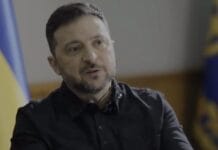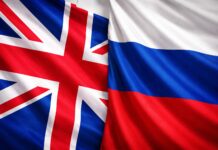Russia accused of indiscriminate civilian targeting; Zelensky, EU, and global leaders condemn attack on Ukrainian university centre
A devastating missile strike in the northern Ukrainian city of Sumy has left at least 34 people dead and 117 injured, including 15 children, marking one of the most lethal attacks on Ukrainian civilians in recent months. Ukrainian authorities say two Russian Iskander-type ballistic missiles struck near Sumy State University and its congress centre—an area heavily used for education and community activities.
The missiles hit just after 10:15 local time on Palm Sunday, a religious holiday in Ukraine, and appear to have been packed with cluster munitions—weapons known for their wide-area impact and indiscriminate lethality.
Education and Civilian Hubs Devastated
Ukrainian President Volodymyr Zelensky described the incident as an act of pure terrorism, noting that even an infant born this year was among the injured. “It hit the heart of the city, and on Palm Sunday,” he said in a televised statement. “Only deranged criminals could do such a thing.”
Local officials said the blast zone included schools, cafes, apartment blocks, and public transport infrastructure, with widespread structural damage to over 20 buildings. Eyewitnesses described scenes of devastation, with bodies strewn across the streets, mangled vehicles, and shattered shopfronts.
A local mother, Nataliia, narrowly escaped the strike with her child, recounting that she had just reached a shelter when the second missile struck her car. “If we hadn’t moved on time, we’d be dead,” she told the BBC.
Another witness, Svitlana Smirnova, had been attending a Palm Sunday service before running for cover. Her friend, caught in a bus that was hit, remains unconscious in hospital after emergency surgery.
Global Leaders React with Condemnation and Calls for Action
The attack has drawn immediate and widespread condemnation from across the international community. UK Prime Minister Sir Keir Starmer labelled the strike “horrific,” urging Russian President Vladimir Putin to “accept an unconditional ceasefire, as Ukraine already has.”
French President Emmanuel Macron echoed the sentiment, writing on social media that Russia’s continued aggression proves its complete disregard for human lives and diplomatic engagement. “The Sumy attack reinforces the need for a coalition willing to enforce peace,” he said, referring to ongoing efforts with the UK to form a European-led peace enforcement initiative.
US special envoy Keith Kellogg called the assault a violation of all norms of warfare and human decency, stressing that it underscores the urgency behind President Donald Trump’s push to bring the conflict to a negotiated end.
Russia Remains Silent, Despite Backchannel Engagements
Despite the high civilian toll, the Kremlin has not issued an official statement regarding the Sumy attack. However, diplomatic efforts continue behind closed doors. US envoy Steve Witkoff met with President Vladimir Putin in St Petersburg last week—his third such meeting this year. Russian sources described the talks as “productive” and centered on Ukraine.
European leaders remain sceptical, suggesting that Russia’s actions continue to undercut its diplomatic rhetoric. Ukrainian officials argue that the latest strikes reinforce the need for stronger pressure, not softer negotiations.
A Turning Point in the War’s Political Optics?
The attack on a university and children’s centre may represent a tactical escalation with strategic consequences. While Russia has often targeted infrastructure, such an overt strike on a symbol of civil society has shifted global attention and intensified calls for tougher diplomatic and economic consequences.
With the EU and UK openly discussing coordinated peace enforcement mechanisms, the next few weeks could see a reconfiguration of the West’s approach—from support and sanctions to direct enforcement and conditional diplomacy.
In the meantime, Ukraine continues to appeal for air defence systems and sustained global pressure, asserting that only deterrence, not dialogue alone, can stop future atrocities.



